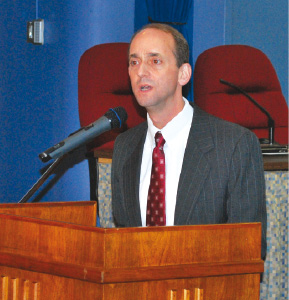
By Leslie Collins
Northeast News
October 19, 2011
Despite a fair rating, the state auditor said Kansas City, Missouri School District’s audit is not “a bad news story.”
A year prior, the school district would have received the score of poor, he said.
Currently, the state rates audit performance with scores of excellent, good, fair and poor.
“We see an overall positive trend in the district and were very impressed with some of the actions taken,” State Auditor Tom Schweich said during an Oct. 11 press conference at KCMSD headquarters.
The audit evaluated the fiscal year that ended June 30, 2010, with the goal of identifying whether or not KCMSD spent public funds properly.
During the audit, district officials were cooperative and have taken the recommendations to heart, he said.
“We did not find any incident of fraud except for one,” Schweich said.
The fraud involved Jamia Dock, former principal at Lincoln College Preparatory Academy, who allegedly embezzled $58,000 from student activity funds.
The audit stated the embezzlement resulted from “inadequate controls over student activity funds.”
Dock has been indicted and charged with one count of theft/stealing property or services worth $25,000 or more.
Between June and August of 2009, Dock initiated and signed 39 withdrawals via bank counter checks at several bank branches after the student activity account check book had been turned in to the district office for the summer, the audit stated.
“The bank contacted the district (in August of 2009) to point out the district had a negative account balance on the student activity fund and that’s how the district found out,” Schweich said.
KCMSD terminated Dock from her position in September of 2009, but she was hired as principal of ACE Upper Campus, a district contractor, for the 2010-2011 school year.
KCMSD must continue to provide timely, monthly reports, including bank reconciliations and supporting documentation, to detect and correct errors in a timely manner, the audit stated.
Student incentives
Another area that needed improvement involved the disbursement of student incentives. KCMSD spent nearly $2 million from fiscal years 2008 to 2010 in student incentives, but there were no procedures or monitoring in place to track whether or not the prizes were actually given to students, he said. If the district wants to offer an incentive program, it needs to be closely monitored, he said. KCMSD officials have assured Schweich the district will better monitor the incentive program in the future, he said.
Schweich questioned the amount spent on food and meals not associated with child nutrition or employee meal costs while traveling.
During fiscal year 2008, the district spent $924,367 on food and $778,605 in 2009.
“We think that is very high by normal school district standards,” Schweich said.
The district spent money on food for a number of events, including staff meetings, staff appreciation events, retirement parties, staff trainings, award ceremonies, banquets, among others.
One example cited in the audit involved a school board member who charged $103 to a procurement card on April 18, 2009, and charged another $70 to the card on March 2, 2010. Despite providing detailed receipts, there was no documentation on who attended the two meetings or why the meetings were held.
“Without detailed supporting documentation, including the purpose of the event and attendees, the district cannot determine if expenditures were reasonable and necessary uses of public funds,” the audit stated.
The audit recommended the district establish guidelines for food purchases and ensure that sufficient documentation is provided.
However, Schweich commended the district for cutting down on food costs during fiscal year 2010, in which the district spent $330,497 on food. Part of the reduction stemmed from eliminating the procurement cards and requiring purchase orders. The school district has since required meeting agendas and sign-in sheets to be submitted to the district’s business office.
Surplus property
Since closing a number of schools as part of the “right-sizing” initiative, the district failed to adequately keep track of inventory and surplus property, he said. Auctions for surplus property should be held more than every five years, Schweich stressed.
“The district currently maintains excessive amounts of surplus property and does not maintain a list of surplus property not capitalized, such as lunch tables, student desks and chairs,” the audit stated.
Property is also stored in “an unorganized manner,” the audit said.
Schweich said he understands the district has certain restrictions on selling its shuttered buildings due to bond contracts, but said it must work to sell the buildings as quickly as possible. During the fiscal year that ended on June, 30, 2011, the district spent $2.2 million in utilities and insurance for shuttered schools, he said.
As a result of not properly tracking inventory, the district paid to lease 11 copiers that were not in use.
Until recently, the district failed to monitor overtime pay and did not restrict how much overtime an employee could receive. In 2008, the district payed $2.9 million in overtime and $2.5 million in 2009. One custodian received more than $56,000 in overtime one year and his annual salary is $41,509.
The district cut its handout of overtime pay to slightly over $1 million in 2010, began monitoring overtime and approved a new overtime policy.
“This is exactly the positive trending we like to see,” Schweich said.
District headed in right direction
KCMSD Chief Financial Officer and Treasurer Rebecca Lee-Gwin said the district is continuing to make improvements. She pointed out the district has maintained a balanced budget two years in a row and that for the first time in a decade, revenue is increasing.
“I think the board of directors is committed to being as transparent as they can with the community,” Lee-Gwin told reporters. “If you know you have a problem, you can correct it, but you have to identify the problem first.
“I think we have made tremendous progress… I really feel like the superintendent, the board and the staff are really committed to reaching these goals (set forth in the audit).”

















